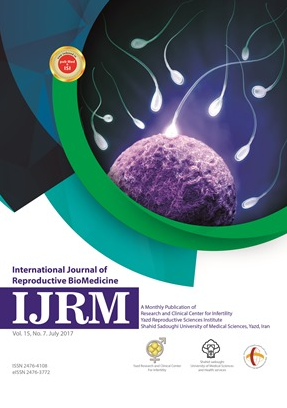
International Journal of Reproductive BioMedicine
ISSN: 2476-3772
The latest discoveries in all areas of reproduction and reproductive technology.
Iranian women’s experiences of infertility: A qualitative study
Published date: Jan 26 2020
Journal Title: International Journal of Reproductive BioMedicine
Issue title: International Journal of Reproductive BioMedicine (IJRM): Volume 18, Issue No. 1
Pages: 65-73
Authors:
Abstract:
Background: There are concerns and diverse experiences related to infertility and childlessness. The lived experience of infertile people from various cultures needs to be explored.
Objective: The aim of this qualitative study was to explore Iranian women experiences of their infertility.
Materials and Methods: The data comprised interviews about fertility issues in the Persian language with eighteen women, aged 17-45 yr old, who agreed to be interviewed at the Mottahari Infertility Treatment Clinic, affiliated to the Urmia University of Medical Sciences about their fertility problems. They were approached by the researchers at the time of their first visit. The verbatim transcribed interviews were analyzed using deductive conventional content analysis.
Results: The experiences of the informants were conceptualized into four major themes: 1) Shock (subthemes: Disbelief and Denial); 2) Reaction (subthemes: Distress, Guilt, Loss of self-esteem and Sexual reluctance); 3) Processing (subthemes: Internal processing, Avoidance, Marriage at risk, External processing, Stigma caused by the family and Stigma caused by the community) and 4) Reorientation (subthemes: Forgetting, Marriage to saving marriage and Sexual consent).
Conclusion: Infertility can be a challenging condition. Considering that infertilityrelated issues affect Iranian women more contextual factors is necessary. So, culturally sensitive and gender specific protocols are suggested to provide suitable and about culturally sensitive and genderspecific protocols is a necessity in order to provide suitable care to infertile women.
Key words: Iran, Women, Infertility, Qualitative.
References:
[1] Gurunath S, Pandian Z, Anderson RA, Bhattacharya S. Defining infertility-a systematic review of prevalence studies. Hum Reprod Update 2011; 17: 575–588.
[2] World Health Organization. Developing sexual health programmes: a framework for action. Geneva: World Health Organization; 2010.
[3] Cousineau TM, Domar AD. Psychological impact of infertility. Best Pract Res Clin Obstet Gynaecol 2007; 21: 293–308.
[4] Van Balen F, Gerrits T. Quality of infertility care in poor-resource areas and the introduction of new reproductive technologies. Hum Reprod 2001; 16: 215–219.
[5] Mindes EJ, Ingram KM, Kliewer W, James CA. Longitudinal analyses of the relationship between unsupportive social interactions and psychological adjustment among women with fertility problems. Soc Sci Med 2003; 56: 2165–2180.
[6] Akizuki Y, Kai I. Infertile Japanese women’s perception of positive and negative social interactions within their social networks. Hum Reprod 2008; 23: 2737–2743.
[7] Lara LA, Salomao PB, Romao AP, Reis RM, Navarro PA, Rosa-e-Silva AC, et al. Effect of infertility on the sexual function of couples: state of the art. Recent Pat Endocr Metab Immune Drug Discov 2015; 9: 46–53.
[8] Graneheim UH, Lundman B. Qualitative content analysis in nursing research: concepts, procedures and measures to achieve trustworthiness. Nurse Educ Today 2004; 24: 105–112. [9] Bhat A, Byatt N. Infertility and perinatal loss: when the bough breaks. Curr Psychiatry Rep 2016; 18: 31– 48.
[10] Yazdkhasti F. Social skills and perceived maternal acceptance-rejection in relation to depression in infertile women. Int J Fertil Steril 2011; 5: 72–77.
[11] Lamas C,·Chambry J, Nicolas I, Frydman R, Jeammet P, Corcos M. Alexithymia in infertile women. J Psychosom Obstet Gynecol 2006; 27: 23–30.
[12] Papreen N, Sharma A, Sabin K, Begum L, Ahsan SK, Baqui AH. Living with infertility: experiences among urban slum populations in Bangladesh. Reprod Health Matters 2000; 8: 33–44.